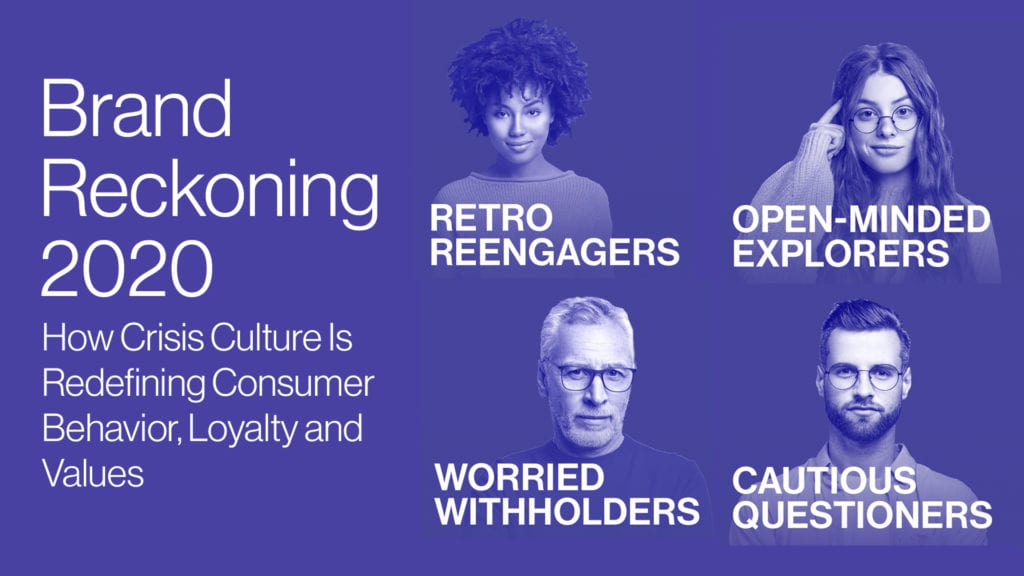A once-in-a-lifetime moment of reckoning has arrived for brands across every industry. As the COVID-19 crisis continues to unfold—alongside intensified calls for social justice reforms—data from Ketchum’s new study, Brand Reckoning 2020: How Crisis Culture Is Redefining Consumer Behavior, Loyalty and Values demonstrates a seismic shift in what consumers value.

In mid-June, three months into the coronavirus pandemic in the U.S., we surveyed more than 3,000 Americans in what we believe is the first study to divide U.S. consumers into personas based on their reactions to the current environment. Our goal was to explore crucial questions for our clients and Ketchum teams supporting them. How willing are consumers to reengage with the outside world? What can we learn from how this differs from person to person? How have today’s culture crises changed consumer values—is brand loyalty at risk? Does it matter more if companies do the right thing?
The survey data was surprisingly clear, signaling a huge impact on brands. Nearly half of Americans (45%) said their brand preferences have changed since the COVID-19 crisis began. Three-quarters said COVID-19 has shown how unnecessary some of their past purchases were. And the cornerstone of brand loyalty, the brand itself, is proving to be fragile: 63% report they will purchase more private label items in the future. Furthermore, a majority (62%) of Americans expect that their brand preferences will change permanently before the pandemic ends.
Consumers are also questioning the behavior of the companies behind the brands. Close to 9 in 10 (88%) said the coronavirus has made it more important that companies behave ethically. Three-quarters (74%) said recent protests against racial injustice have made it more important to support businesses that improve diversity and inclusion, and a similar number (72%) said it is more important to support minority-owned business through their purchases. Customer and employee safety now share equal billing at the top of the list of what matters to consumers.
Implications of the Brand Reckoning
Companies that take a business-as-usual approach to their brands could find themselves losing loyal customers, revenues and the chance to acquire new customers. Instead, companies should cultivate an evolution mindset and consider the following approaches.
Understand your audiences. A major focus of our study was to use data to capture and describe the various personas emerging in this crisis environment. They are defined along two axes: change in values and openness to reengage. The four types (learn more) encompass:
- Retro Reengagers—ready to return to the world as it was (representing 33% of consumers)
- Open-Minded Explorers— have new priorities as they return to a world reopening (22%)
- Worried Withholders— not easily influenced, preferring their comfort zones (20%)
- Cautious Questioners—keeping their distance until they know more (25%)
Brands who do a similar analysis of their own target customers can uncover surprising nuances about the beliefs and attitudes that influences purchase decisions, pointing to clear opportunities to engage in meaningful ways. It’s important to know that this is not set in stone—individuals may cross fluidly from one persona to another because of personal or broader community drivers. Make sure your strategies for engagement are aligned with the crisis culture’s constant rate of change.
Be ultra-relevant. Be authentic. The data clearly shows that loyalty is less locked in than ever. This holds true for me. What I thought of as unwavering loyalty to a brand of paper towels has come into question because I simply couldn’t get my preferred brand. I’m not more open to substitutions generally, but I’ve now discovered that other brands are comparable substitutes. At the same time, headlines show that consumers are willing to boycott a favorite food brand if the company leader aligns with political values that clash with consumers’ beliefs.
Ultimately, consumers are showing a preference for brands that connect in ways relevant to the current situation and in a voice that is authentic. (Our data shows that 25% have started purchasing a product because of a leader’s behavior.) Ensure that your messages and your actions are genuine and make sense to the audience’s experience.
Decide from a place of data. Real-time, fluid and nimble research is key to match today’s rate of change. Tactics like social listening tools and analysis of search data are all part of the equation getting ahead of issues by predicting, monitoring and rapidly responding to trends.
We all know shift happens, but it’s happening now at an unimaginable scale and speed. These are just some of the hundreds of insights from the Brand Reckoning 2020 study. Reach out if you’d like to discuss what our data means for your brand or organization, or hear about the Ketchum research tools and services that can help you monitor, understand and react to what your customers are experiencing.


